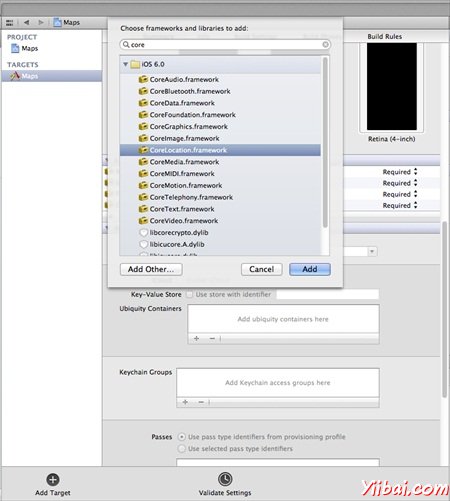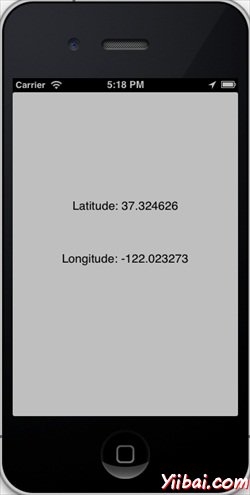iOS - 位置处理
简介
在 iOS 系统中,我们可以很容易地找到用户的当前位置,用户允许应用程序访问的核心位置框架的帮助信息。
涉及的步骤
1. 创建一个简单的 View based application.
2. 选择项目文件,然后选择目标,然后添加如下所示 CoreLocation.framework。

3. 添加两个标签在ViewController.xib并创建 ibOutlets 命名标签分别为 latitudeLabel 和 longitudeLabel。
4. 现在创建一个新的文件,通过选择 File-> New -> File... -> select Objective-C类并点击 next
5. 命名类为 LocationHandler ,并设置为 NSObject 的子类.
6. 选择创建
7. 更新 LocationHandler.h 如下
#import <Foundation/Foundation.h> #import <CoreLocation/CoreLocation.h> @protocol LocationHandlerDelegate <NSObject> @required -(void) didUpdateToLocation:(CLLocation*)newLocation fromLocation:(CLLocation*)oldLocation; @end @interface LocationHandler : NSObject<CLLocationManagerDelegate> { CLLocationManager *locationManager; } @property(nonatomic,strong) id<LocationHandlerDelegate> delegate; +(id)getSharedInstance; -(void)startUpdating; -(void) stopUpdating; @end
8. 现在更新LocationHandler.m如下:
#import "LocationHandler.h" static LocationHandler *DefaultManager = nil; @interface LocationHandler() -(void)initiate; @end @implementation LocationHandler +(id)getSharedInstance{ if (!DefaultManager) { DefaultManager = [[self allocWithZone:NULL]init]; [DefaultManager initiate]; } return DefaultManager; } -(void)initiate{ locationManager = [[CLLocationManager alloc]init]; locationManager.delegate = self; } -(void)startUpdating{ [locationManager startUpdatingLocation]; } -(void) stopUpdating{ [locationManager stopUpdatingLocation]; } -(void)locationManager:(CLLocationManager *)manager didUpdateToLocation: (CLLocation *)newLocation fromLocation:(CLLocation *)oldLocation{ if ([self.delegate respondsToSelector:@selector (didUpdateToLocation:fromLocation:)]) { [self.delegate didUpdateToLocation:oldLocation fromLocation:newLocation]; } } @end
9. 如下更新 ViewController.h 我们实现了 LocationHandler 委托并创建两个 ibOutlets。
#import <UIKit/UIKit.h> #import "LocationHandler.h" @interface ViewController : UIViewController<LocationHandlerDelegate> { IBOutlet UILabel *latitudeLabel; IBOutlet UILabel *longitudeLabel; } @end
10. 更新 ViewController.m 如下:
#import "ViewController.h" @interface ViewController () @end @implementation ViewController - (void)viewDidLoad { [super viewDidLoad]; [[LocationHandler getSharedInstance]setDelegate:self]; [[LocationHandler getSharedInstance]startUpdating]; } - (void)didReceiveMemoryWarning { [super didReceiveMemoryWarning]; // Dispose of any resources that can be recreated. } -(void)didUpdateToLocation:(CLLocation *)newLocation fromLocation:(CLLocation *)oldLocation{ [latitudeLabel setText:[NSString stringWithFormat: @"Latitude: %f",newLocation.coordinate.latitude]]; [longitudeLabel setText:[NSString stringWithFormat: @"Longitude: %f",newLocation.coordinate.longitude]]; } @end
输出
现在,当我们运行程序时,我们会得到下面的输出。


